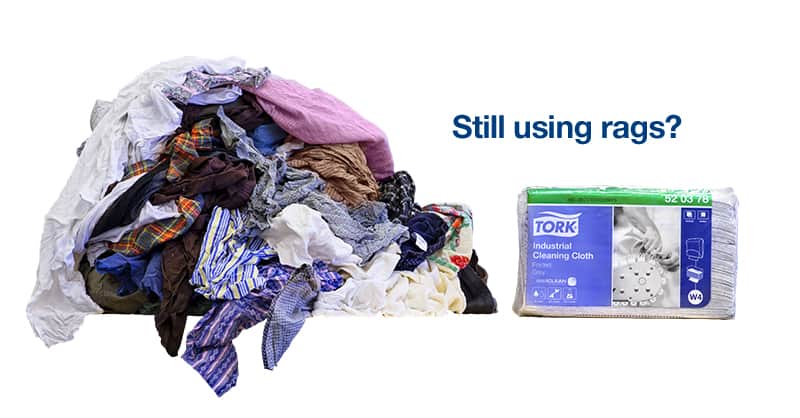Much of what we think of today as environmentally sound practices and policy is a result of decades-old thinking. On its face, the idea of reuse and recycling seems to confer obvious benefits to both the environment and to us. But as we look beyond simple household practices, a more complex picture emerges of what constitutes best practices for the environment and for industry. The difference between using, for example, cloth napkins versus paper napkins in a household setting just doesn’t translate to an industrial surface coatings worksite of 150 employees.
For heavy industrial settings like shipyards, paint shops, printing presses and auto-repair businesses, wiper and hygiene products are of particular importance. Wipers may have specific applications involving regulated or hazardous chemicals. “Environmental safety” in these cases may refer to the environment at large or the environment workers may safely work in. The added complexities of these applications, work settings and cost-benefit analysis are cause to rethink what best practices are from an environmental perspective.
The obligation to satisfy corporate, customer and shareholder interests in being environmentally conscious is clear, but these interests must align with business concerns over cost, efficacy and the budgetary constraints as well. The key is to balance these concerns and use available insight and analysis to determine the smartest path forward. Wiper solutions are a less obvious, yet integral part of this process for any business that counts the shop floor as part its existence.
As this post shows, it’s important to examine the full lifecycle of textile rags and wipers – from performance and usage, storage issues and disposal concerns – to determine the benefits and consequences for both the business and the environment.
In-use scenarios – Benefits and drawbacks
The decision to use rags, laundered shop towels or disposable wipers is a complicated one, and one that deserves added scrutiny. To start our analysis, it’s helpful to look at exactly how each is used, and how that impacts their use value. From here, we can also see their supposed environmental benefits and drawbacks.
Rags
In terms of quality and application, rags offer the least amount of certainty and greatest discrepancies in terms of quality. This often means sorting through the bundle to find a suitable rag to use and given the varied materials the worker may need to use multiple rags to get the job done.
Laundered shop towels
Though laundered/rental shop towels seem to offer environmental benefits from being reusable, a closer look reveals problems. The process itself of picking, transporting, laundering off-site and delivering the wipers adds to the environmental impact. As well, the laundering process is not 100% effective in removing debris and possible toxins. Hazardous chemicals used in one industry may expose workers via laundered wipers in other workplaces. Whereas one worksite may have protocols in place for mitigating, for example, lead exposure, other sites that don’t handle such materials may not. It adds an unpredictability and unknown “what if” factor into the equation.
Disposable wipers
The ability to design wipers for different tasks/applications has made disposable wipers ideal for a wide variety of industrial uses. Their quality allows for ease-of-use and uncommon strength.. Disposable wipers are designed to release solvents evenly and, as a result, are proven to use up to 23% less solvent*, which is beneficial to the environment and saves money for the facility. Each wiper is fresh, hygienic, consistent in size and quality. Being disposable, they also ensure that contaminants don’t return to random workplaces and expose workers. Additionally, given their specificity of purpose and wide range of design and uses, they are more efficient and therefore workers us less to do the job.
Time is money. So is space.
This would be a prime example of where the flexibility of the term, “environment” comes into play. There is the environment offsite, and then there’s the onsite environment. Concerns over workplace resources must be weighed carefully with larger environmental concerns. Here’s how the three options stack up.
Rags
Often packaged and delivered in large bales that are often large and unwieldy, rags demand more space and resources to store, maintain and deploy to the shop floor. Also, the number of rags per package varies widely, creating uncertainty in ordering. With shelf space at a premium for most work environments, the expense of allocating storage for rags comes at the expense of other, more critical supplies. And the concern goes beyond the storage at facilities. Larger shipments require more frequent transportation and results in higher overall emissions, causing greater environmental harm.
Laundered shop towels
Because laundered wipers are delivered regularly to facilities and stored onsite, the added resources they demand in terms of processing can add up. In addition to regular waste storage, space and personnel must be allocated for storing and processing the regular pickups and drop-offs of the wipers. These deliveries not only contribute to higher transportation emissions, but also contribute to higher personnel costs, figuring negatively into the cost-benefit analysis.
Disposable wipers
Disposable wipers take up less space than rags and rental towels, freeing up room for other inventory. By some measures, disposable wipers take up 65% to 75% less room than rags. This significant space savings means more room for storing other supplies, materials and inventory.
And the space-saving benefits of wipers go beyond facility. The benefits are seen during transport as well. Less space on trucks means less overall shipping requirements and less emissions.
Even in the end, disposables win
By taking up less space in landfills or hazardous waste bins, disposable products have less environmental impact than rags or rentals.
Rags
From a simple space/mass perspective, rags take up significantly more space than disposable wipers. And due their increased weight and mass, disposal costs can be higher. All of this leads to a greater environmental impact at the landfill.
Laundered shop towels
As previously discussed, their need for special laundering and processing mean considerations may need to be given to handling and disposal of hazardous substances. The added processing also generates a significantly higher amount of waste byproducts. In some states like Connecticut, concerns about pollutants have led to off-site laundering facilities are required to have a wastewater discharge permit allowing it to discharge wastewater from industrial rags. Wastewater, laundry sludge and the energy needed to transport, wash and process the towels need to be figured into the equation. As well, since the towels have as few as 4 total uses, their final use is followed by a trip to the landfill, regardless.
Disposable wipers
All wipers, regardless of type, eventually end up in the landfill or incinerated. Disposable wipers are lighter and less voluminous than rags or laundered shop towels, and therefore take up less space in the landfill or in hazardous waste containers. And since disposable wipers can be used for boiler fuel in some cases, the argument can be made that disposable wipers have the least environmental impact of the three.
Conclusions
Without the environmental impact of laundering towels or the added weight and space of rags, disposable wipers offer the greatest benefits in terms of environmental considerations. Many factors go into selecting a wiper solution for any particular workplace, environmental factors being just one of them. The conventional wisdom regarding “environmental best practices” deserves a second look, especially with the complexities of balancing public interest vs. private interests. When the three major factors of use, storage and disposal are properly analyzed, the results may well contradict conventional wisdom about environmental best practices.
Learn More
Want to know more about paper solutions to B2B problems? Explore our other white papers and thought leadership pieces at talktork.com/industrial.com.

